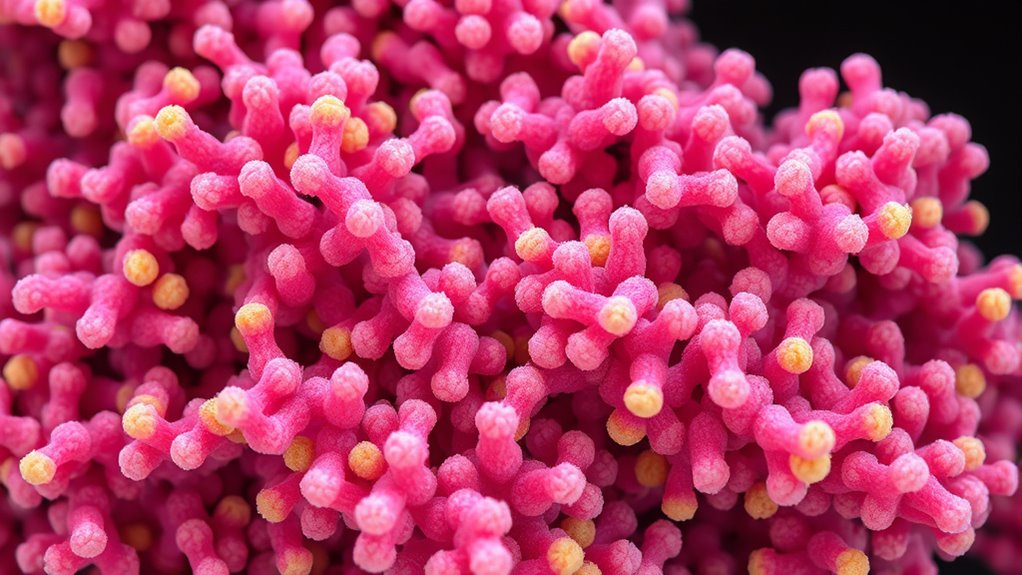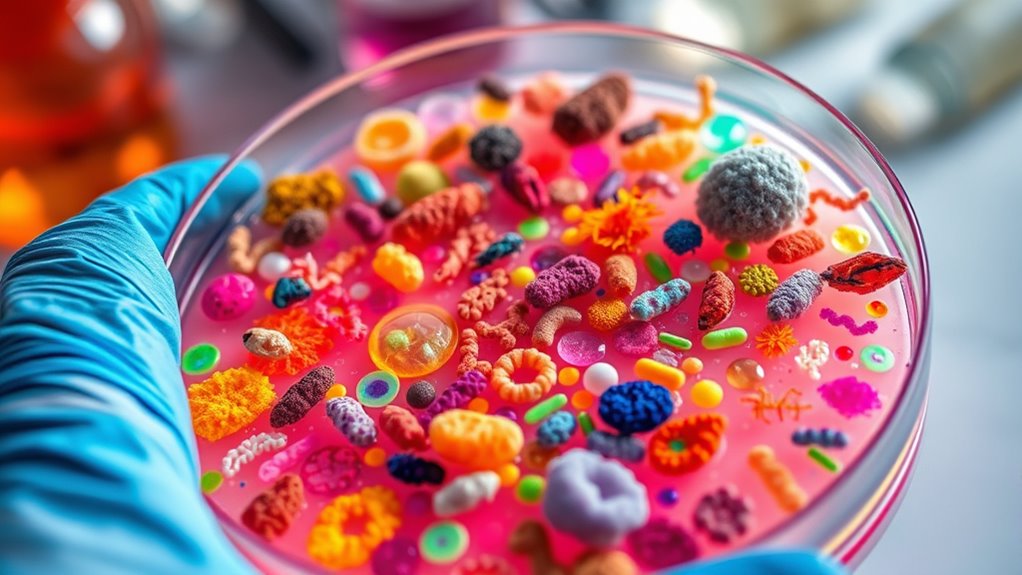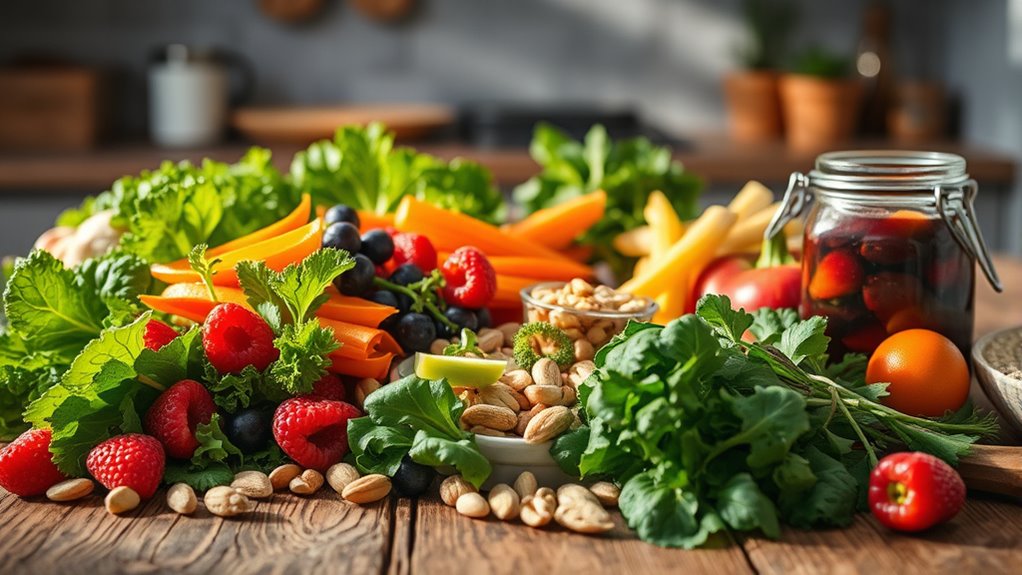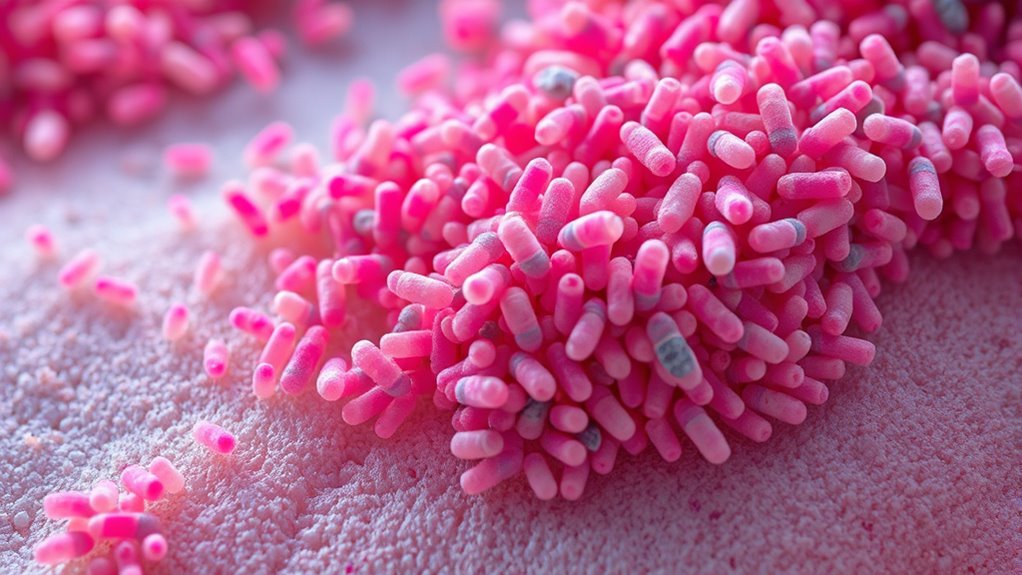A diverse gut microbiome is key to your overall health because it helps with digestion, boosts immunity, and even influences your mood. When you have a variety of beneficial bacteria, your body can resist infections, reduce inflammation, and stay balanced. Lifestyle factors like your diet, stress levels, and sleep habits play a big role in maintaining this diversity. Keep exploring how you can support your microbiome to open your best health yet.
Key Takeaways
- A diverse gut microbiome enhances resilience against infections and supports overall digestive health.
- Greater microbial diversity promotes immune regulation and reduces inflammation.
- Consuming a variety of foods, especially fiber-rich and fermented options, boosts microbiome diversity.
- Lifestyle factors like stress, sleep, and environment significantly influence microbiome health.
- Maintaining diversity in gut bacteria is essential for nutrient absorption, vitamin production, and mental well-being.
What Is the Gut Microbiome?

What exactly is the gut microbiome? It’s the collection of trillions of microorganisms living in your digestive system, mainly in your intestines. These microbes include bacteria, viruses, fungi, and other tiny organisms. They play a vital role in breaking down food, absorbing nutrients, and supporting your immune system. The microbiome acts like a finely tuned ecosystem, with each type of microorganism performing specific functions that keep your body balanced. It influences your mood, energy levels, and even your risk for certain diseases. Maintaining a balanced microbiome is essential for overall well-being, as it impacts nearly every aspect of your health. Diverse microbial communities are key to a healthy microbiome, promoting resilience and optimal functioning.
Why Diversity Matters in Your Microbial Community

Having a diverse gut microbiome helps keep your system resilient against disruptions. It prevents harmful pathogens from taking over and causing infections. When your microbial community is rich, it naturally supports better overall health. Incorporating a variety of beneficial bacteria can also improve microbial diversity, which is crucial for maintaining a balanced and healthy gut environment.
Richness Supports Resilience
A diverse gut microbiome is essential because it makes your microbial community more resilient to disturbances. When your gut hosts a variety of bacteria, it can better adapt to changes like illness, antibiotics, or dietary shifts. This richness provides multiple functions, ensuring that if one species declines, others can step in to fill the gap. With a diverse community, your gut can maintain stability and recover more quickly from disruptions. The variety of microbes also supports different metabolic processes, strengthening your overall health. Resilience isn’t just about bouncing back; it’s about staying balanced and functional despite challenges. By fostering microbial richness, you help your gut respond to stressors effectively, reducing the risk of dysbiosis and promoting long-term health. Additionally, a diverse microbiome can influence immune regulation and inflammation, further enhancing your body’s ability to defend against pathogens and maintain homeostasis.
Prevents Dominance of Pathogens
A diverse gut microbiome plays a key role in keeping harmful pathogens from taking over. When your microbial community is varied, beneficial bacteria compete effectively for resources and space, leaving fewer opportunities for dangerous invaders to establish themselves. This competition creates a hostile environment for pathogens like Clostridium difficile or Salmonella. Additionally, many healthy microbes produce substances such as acids or antimicrobial compounds that directly inhibit harmful bacteria. With greater diversity, your gut is better equipped to prevent infections and maintain balance. If diversity drops, pathogens can more easily dominate, increasing your risk of illness. By supporting a wide range of beneficial microbes through diet and lifestyle, you help ensure that no single pathogen can become dominant, keeping your gut healthy and resilient.
How the Microbiome Supports Digestion and Immunity

Ever wonder how your gut microbiome helps keep you healthy? Your microbiome plays a crucial role in digestion by breaking down complex carbohydrates, fiber, and other nutrients that your stomach alone can’t process. This not only aids absorption but also produces necessary vitamins like B12 and K. When it comes to immunity, your microbes act as a first line of defense, training your immune system to distinguish between harmless and harmful invaders. They help regulate inflammation and prevent overreactions that could lead to autoimmune issues. By maintaining a balanced microbial community, you support ideal digestion and strengthen your immune responses. Microbiome diversity is essential for overall health, as a more varied community can better adapt to environmental changes and resist pathogenic invasions. Basically, a diverse microbiome acts as both your digestive partner and immune protector, keeping your body resilient and functioning smoothly.
Factors That Influence Microbiome Diversity

Your gut microbiome’s diversity doesn’t happen by chance; it’s shaped by factors that determine which microbes thrive and which don’t. Diet plays a huge role—what you eat feeds certain bacteria and influences their growth. Antibiotics can wipe out beneficial microbes, making it harder for diversity to recover. Stress and lack of sleep weaken your immune system, making your gut more vulnerable to imbalance. Lifestyle choices, like smoking or excessive alcohol, also harm microbial variety. Environmental exposures, such as pollutants or pets, introduce new microbes, affecting your gut ecosystem. Consider this: Microbial Diversity is crucial for overall health and resilience.
Practical Steps to Boost Your Microbial Balance

To support a healthy gut microbiome, start by eating a variety of foods to introduce different beneficial bacteria. Incorporate fermented items like yogurt, kefir, or sauerkraut into your diet to add live probiotics. Also, cut back on processed foods, which can harm your microbial balance and overall gut health. Engaging in yoga practices can also help reduce stress, which is beneficial for maintaining a balanced gut microbiome.
Eat Diverse Foods
Incorporating a wide variety of foods into your diet is one of the most effective ways to support a healthy gut microbiome. When you eat diverse foods, you expose your gut to different types of fibers, nutrients, and phytochemicals that feed various beneficial bacteria. Focus on including fruits, vegetables, whole grains, nuts, and seeds, which provide different fibers and nutrients that promote microbial diversity. Avoid sticking to the same foods every day; instead, rotate your choices to introduce new strains of bacteria. This variety helps create a resilient and balanced microbiome that can better protect you against illness and aid digestion. Additionally, eating a range of foods can influence your lifestyle by supporting overall wellness and vitality. By consciously diversifying your diet, you support your gut’s ecosystem and overall health.
Incorporate Fermented Items
Adding fermented foods to your diet is a simple and effective way to enhance your gut microbiome. These items, like yogurt, kefir, sauerkraut, kimchi, and kombucha, are rich in beneficial probiotics that support a healthy balance of gut bacteria. Including a small serving daily or a few times a week can introduce diverse strains of microorganisms, which may improve digestion, boost immunity, and reduce inflammation. When choosing fermented foods, opt for unpasteurized varieties, as pasteurization kills beneficial live cultures. Incorporate them into meals or enjoy them as snacks. Consistency is key—regularly adding fermented items helps sustain the microbial diversity your gut needs for ideal health. Remember, these foods complement a balanced diet and are part of a broader strategy to nurture your gut microbiome.
Limit Processed Choices
Reducing your intake of processed foods is a crucial step in supporting a healthy gut microbiome. These foods often contain additives, preservatives, and refined sugars that can harm beneficial bacteria. By cutting back, you create a more favorable environment for your gut flora to thrive. Focus on whole, natural foods instead. To help, consider these tips:
- Choose fresh fruits and vegetables over packaged snacks
- Read labels to avoid artificial ingredients
- Prepare meals at home to control ingredients
- Limit sugary and artificial sweeteners
- Opt for whole grains instead of refined carbs
- Incorporate fiber-rich foods into your diet to nourish your beneficial gut bacteria.
The Impact of a Healthy Microbiome on Overall Well-Being

A healthy microbiome plays a critical role in maintaining your overall well-being by supporting essential bodily functions. When your gut bacteria are balanced, they aid digestion, help absorb nutrients, and produce necessary vitamins. A diverse microbiome also strengthens your immune system, making it easier to fight off infections. It can even influence your mood and mental health through the gut-brain axis, affecting stress levels and emotional stability. When your microbiome is healthy, inflammation decreases, reducing the risk of chronic diseases like heart disease and diabetes. Overall, nurturing your gut bacteria through a nutritious diet and lifestyle choices directly enhances your energy, resilience, and mental clarity. In short, a thriving microbiome is key to feeling your best every day.
Frequently Asked Questions
Can Probiotics Permanently Change My Gut Microbiome?
You might wonder if probiotics can permanently change your gut microbiome. While they can introduce beneficial bacteria and improve your gut health temporarily, most effects aren’t permanent. Your microbiome is dynamic and influenced by your diet, lifestyle, and antibiotics. To support lasting changes, focus on a balanced diet rich in fiber and fermented foods. Probiotics can help, but long-term health depends on ongoing habits.
How Quickly Can Microbiome Diversity Improve With Lifestyle Changes?
You want to know how fast your microbiome can improve with lifestyle changes. The answer varies, but you might notice improvements within a few weeks if you eat more fiber, include fermented foods, and stay active. Consistency is key; your gut responds to positive habits over time. Keep making healthy choices daily, and you’ll support increased diversity, leading to a healthier, happier microbiome in just a few weeks to months.
Are There Specific Foods That Target Beneficial Microbes?
You’re wondering if specific foods can boost beneficial microbes. Yes, foods rich in fiber like fruits, vegetables, whole grains, and legumes promote good bacteria growth. Fermented foods such as yogurt, kefir, sauerkraut, and kimchi also introduce live beneficial microbes directly into your gut. Incorporating these into your diet can enhance your microbiome diversity and overall health. Remember, consistency is key for long-term benefits.
What Role Do Antibiotics Play in Microbiome Diversity?
Imagine you’re in a medieval battle, and antibiotics are like a giant sword swinging through your gut. They wipe out harmful bacteria, but unfortunately, they also attack beneficial microbes, reducing your microbiome diversity. This imbalance can lead to health issues, making your gut less resilient. So, while antibiotics are essential in fighting infections, they can temporarily disrupt your microbiome, emphasizing the importance of restoring microbial diversity afterward.
Is It Possible to Restore a Damaged Microbiome Naturally?
Yes, you can restore a damaged microbiome naturally. Focus on eating a diverse range of fiber-rich fruits, vegetables, and whole grains to feed beneficial bacteria. Incorporate fermented foods like yogurt, kefir, and sauerkraut to introduce good microbes. Stay active, manage stress, and avoid unnecessary antibiotics. These steps promote a healthy, resilient microbiome, helping it recover and maintain balance over time.
Conclusion
So, here you are, obsessing over probiotics and supplements, hoping to boost your gut health. Ironically, the simplest trick is embracing variety—eating diverse foods and avoiding extremes. Instead of chasing a quick fix, you might find that balance and diversity work better than any magic pill. After all, in the world of microbiomes, more isn’t just merrier; it’s healthier. Who knew that diversity, not perfection, truly paves the way to wellness?









